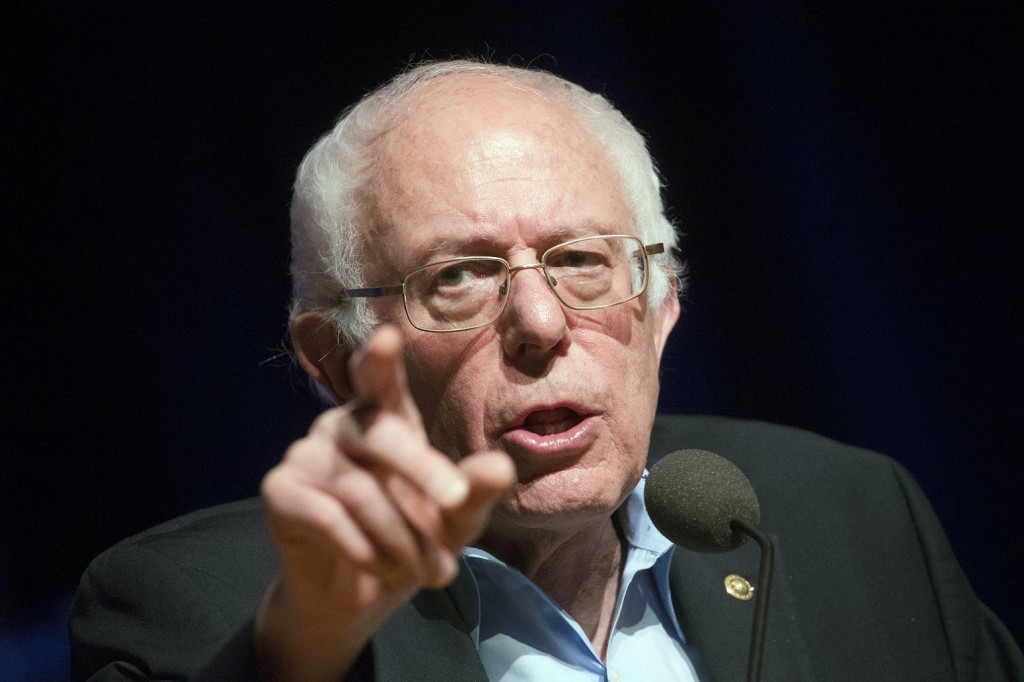- California Assembly OKs highest minimum wage in nation
- S. Korea unveils first graphic cigarette warnings
- US joins with South Korea, Japan in bid to deter North Korea
- LPGA golfer Chun In-gee finally back in action
- S. Korea won’t be top seed in final World Cup qualification round
- US men’s soccer misses 2nd straight Olympics
- US back on track in qualifying with 4-0 win over Guatemala
- High-intensity workout injuries spawn cottage industry
- CDC expands range of Zika mosquitoes into parts of Northeast
- Who knew? ‘The Walking Dead’ is helping families connect
Sanders wins big over Clinton in NH, garnering wide support

Democratic presidential candidate Sen. Bernie Sanders, I-Vt., speaks during a campaign stop at the Pinkerton Academy Stockbridge Theatre, Monday, Feb. 8, 2016, in Derry, N.H. (AP Photo/John Minchillo)
MANCHESTER, N.H. (AP) — Sen. Bernie Sanders won a commanding victory Tuesday over Hillary Clinton in New Hampshire, giving him a crucial win over the onetime front-runner who narrowly beat him in Iowa last week.
Sanders garnered a majority of support from men, women and independents and surged past Clinton in a state she won eight years ago against then-candidate Barack Obama. Near-record turnout and a recent shift in political ideology among Democrats helped buoy Sanders’ early electoral feat.
His win will likely prompt rank-and-file Democrats — and some major campaign donors — to give his candidacy a second look as the race shifts to contests in Clinton-friendly states like Nevada and South Carolina. Most polls in the state closed at 8 p.m. EST, except for a handful in a few tiny towns.
Once labeled a “fringe candidate” by his detractors, Sanders received majority support from younger voters and those who called themselves moderate or political liberal. He was also narrowly favored by women. Clinton, meanwhile, was backed by a majority of voters 65 and older, according to preliminary exit poll data compiled by Edison Research for The Associated Press and the television networks.
Clinton had braced for a potential loss in New Hampshire, the site of her 2008 comeback. She traversed the state’s snow-covered highways with her husband, former President Bill Clinton, and their daughter, Chelsea Clinton, in a push to maintain her edge in national polls and reassure the Democratic establishment backing her campaign.
“This is a great process and as I have said over the last couple of days we’re going to keep working literally until the last vote is cast and counted,” she said Tuesday morning while visiting a Manchester polling station.
In the week since her slim victory in the leadoff Iowa caucuses, Clinton’s campaign has tried to lower expectations for New Hampshire, where Sanders has maintained a steady lead despite her family’s longstanding ties.
Sanders’ gains come amid shifting political ideologies in the state, with two-thirds of Democratic voters on Tuesday identifying as politically liberal. During the 2008 primary, only 56 percent of Democratic voters said the same, exit poll data show.
Sanders, well-known to voters along the state’s Vermont border, stuck to core campaign themes this week in an effort to avoid upsetting a race trending his way.
“I felt like he was the most honest,” said Nicole Reitano, a 24-year-old from Nashua, New Hampshire, who voted for Sanders on Tuesday. “He’s had the same views forever, and he’s never budged. That makes me feel confident in him.”
Clinton, meanwhile, was shouldering renewed troubles amid talk of a potential campaign reshuffling — talk that the former secretary of state dismissed.
“I have no idea what they’re talking about or who they are talking to,” Clinton said on MSNBC. “We’re going to take stock, but it’s going to be the campaign that I’ve got.”
Clinton’s campaign had sought to manage expectations with a circular to her supporters, noting that “whatever happens tonight, we’re ready to get back out there and fight twice as hard tomorrow.”
















